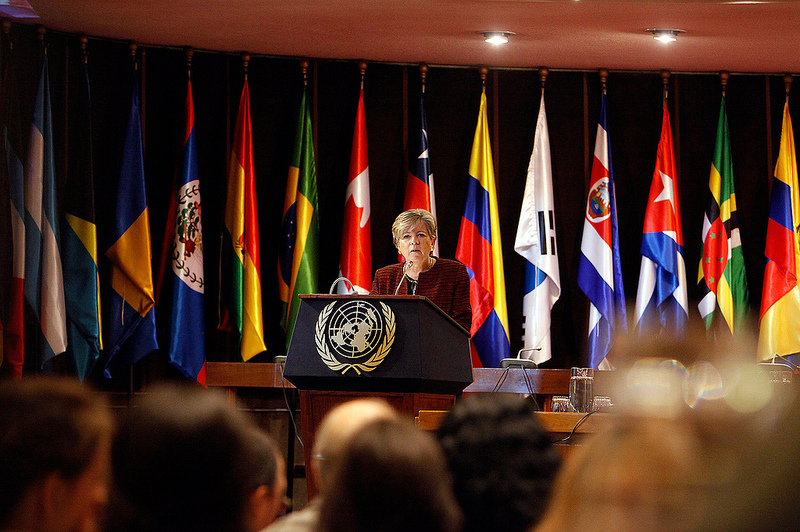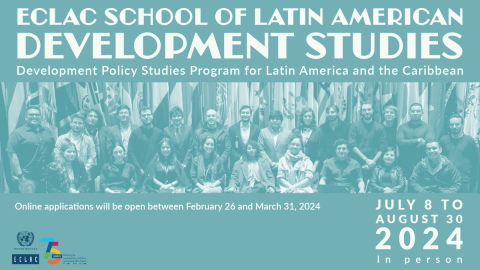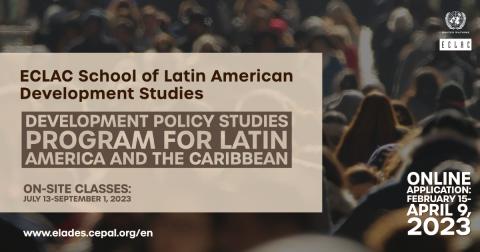Announcement
(22 April 2013) International academics and experts meeting at the Economic Commission for Latin America and the Caribbean (ECLAC) highlighted the relevance of Raúl Prebisch's contributions to Latin American economic thinking, at the 12th Raúl Prebisch Memorial Lecture and the Seminar on neo-structuralism and heterodox economics, which began today at the headquarters of this United Nations regional commission in Santiago, Chile.
For the Raúl Prebisch Memorial Lecture, renowned Brazilian economics professor Luiz Gonzaga Belluzzo gave an address entitled "Transformations in centre-periphery relations and their impact on development in Latin America and the Caribbean", in which he highlighted the contributions of the former Executive Secretary of ECLAC and one of its main inspirations.
Professor Belluzzo was received by ECLAC Executive Secretary, Alicia Bárcena, who welcomed him on behalf of the Commission.
According to Ms. Bárcena "The remarks of Professor Belluzzo include arguments that are in keeping with the basis of our commitment to equality as a right and ethical principle, and to structural change for equality".
In his presentation, professor Belluzzo stressed the importance of recovering the region's process of industrialization, which had been lost in the last 30 years. He stated "Brazil and Latin America in general are now rereading the works of Prebisch, who told us that the region will only be able to concentrate on company size, the nature of business owners and policies to implement if countries resist fragmentation, in other words only if they seek regional integration".
The professor at the University of Campinas and former Economic Policy Secretary of Brazil's Ministry of Finance explained the conditions that facilitated the loss of industrialization in Latin America, and how Asia-Pacific became the world leader in this sphere.
According to professor Belluzzo "The internal division of labour in Asia has enabled it to become one of the world's top exporters. In Asia -and China in particular- the State maintains independence from the particular pressures on economic policy (and unfortunately this is not the case in Brazil or Latin America in general)".
Professor Belluzzo was also one of the main speakers at the first day of the Seminar on neo-structuralism and heterodox economics, which will be held at ECLAC until 23 April.
The seminar aims to promote an interaction between the structuralist tradition and various heterodox approaches for the analysis of current development challenges in Latin America and the Caribbean, and will be attended by high-level participants.
Participants include Luiz Gonzaga Belluzzo; Robert Boyer, from the Institute of the Americas, France; José Antonio Ocampo, from the School of International and Public Affairs, Columbia University, United States; and Jan Kregel, Director of the Monetary Policy and Financial Structure Program of the Levy Economics Institute of Bard College, United States.
Also taking part are Ricardo Ffrench-Davis and Jorge Katz, professors at the University of Chile; João Carlos Ferraz, Vice-President of the Development Bank of Brazil (BNDES); Fernando Porta, Main Researcher at the Centre for Studies on Science, Development and Higher Education (REDES), Argentina; and Fernando Filgueira, Assistant Representative for the United Nations Population Fund (UNFPA) in Uruguay.
At the opening of the seminar, the Executive Secretary of ECLAC explained that the neostructuralist trend is presented not only as an alternative to neoliberalism, but also as a way of overcoming the original structuralist paradigm at its basis. It can be adapted to new times of openness and globalization.
According to Alicia Bárcena, "Neostructuralism means productive transformation with equality, based on structural changes in economies to enable development and economic growth with equality, alongside a financial balance that underpins these changes in the production sphere with social and State support".
The senior United Nations official concluded by saying "We believe in the need to advance neostructuralist thinking by formulating new options and strategies for development. This involves creating a production structure that can enhance Latin America's foreign trade position, increase productive job creation, reduce structural heterogeneity and improve income distribution".
More information on the Prebisch Memorial Lecture and the Seminar on neo-structuralism and heterodox economics is available on the ECLAC website.
Any queries should be sent to the ECLAC Public Information and Web Services Section.
E-mail: prensa@cepal.org; Telephone: (56 2) 2210 2040.
Follow us on: Twitter, Facebook, Flickr and YouTube.



